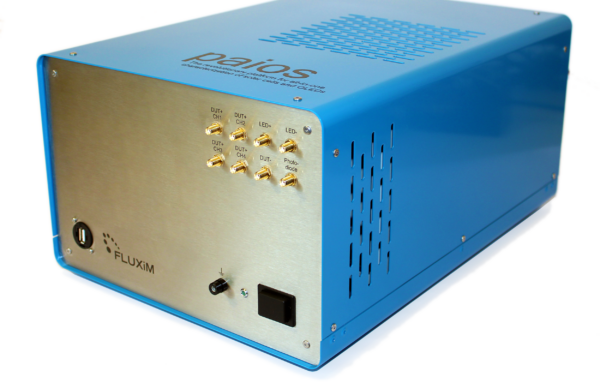Fluxim, a Swiss research and development (R&D) instrument manufacturer, has added a stress test module specifically for perovskite solar cells to its compact optoelectrical characterization tool, known as Paios, which is an R&D system used by organic, perovskite, dye-sensitized, and other thin film solar cell experts since 2012.
“The stress test module is suitable for perovskite solar cell degradation tests. You can stress the device and without moving the sample, you can perform advanced characterizations in DC, AC and transient mode,” Daniele Braga, Head of Sales and Marketing, Fluxim, told pv magazine, adding that advanced characterizations are done during the device stress testing without intervention and based on user-defined protocols.
Data acquisition is supported and managed by the pre-installed software. “For numerical solar cell simulations, you can integrate Paios with our Setfos simulation software,” said Braga.
The stress applied to the solar cells can be voltage, current or maximum power point tracking. Furthermore, the illumination and temperature levels can be controlled. Versatility and consistency are two key benefits of the Paios system, besides the compact size, according to Braga who explained, “You can run many different individual test routines without having to change the setup, nor do you have to change the position of the sample device for each test sequence.”
Typically used within a glovebox or inside a chamber with a controlled atmosphere, Paios is used for a wide range of measurements, for example current-voltage (IV), impedance spectroscopy (IS), charge extraction by linearly increasing voltage (CELIV), intensity modulated photovoltage spectroscopy (IMVS), and deep-level transient spectroscopy (DLTS).
Its add-ons include an automated custom probe station, variable LED sources and detectors, as well as cryostats and a spectrometer.
Popular content

Fluxim
This content is protected by copyright and may not be reused. If you want to cooperate with us and would like to reuse some of our content, please contact: editors@pv-magazine.com.


By submitting this form you agree to pv magazine using your data for the purposes of publishing your comment.
Your personal data will only be disclosed or otherwise transmitted to third parties for the purposes of spam filtering or if this is necessary for technical maintenance of the website. Any other transfer to third parties will not take place unless this is justified on the basis of applicable data protection regulations or if pv magazine is legally obliged to do so.
You may revoke this consent at any time with effect for the future, in which case your personal data will be deleted immediately. Otherwise, your data will be deleted if pv magazine has processed your request or the purpose of data storage is fulfilled.
Further information on data privacy can be found in our Data Protection Policy.